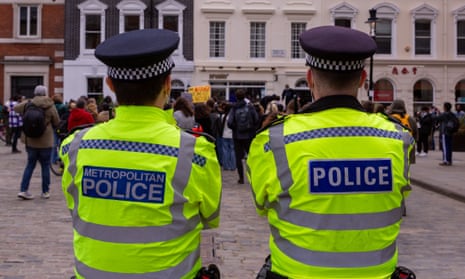At least two-fifths of police forces in England and Wales do not have specialist rape and serious sexual offence (Rasso) units, the Guardian can reveal.
Campaigners against gender-based violence said the lack of such units was deeply worrying at at time of low public confidence in the police and with rape prosecutions running at historically low levels.
The Crime Survey for England and Wales has previously estimated 510,000 women are victims of sexual assaults or rapes in a year. Police recorded 55,696 rapes in the year to 2020-21 but only 3,539 were passed to the Crown Prosecution Service (CPS), leading to just 1,109 convictions.
Out of the 43 territorial police forces, 17 said they did not have a Rasso unit, while five had not responded to freedom of information (FoI) requests submitted by the Guardian prior to publication, meaning the true number could be higher.
Jayne Butler, the chief executive of Rape Crisis England and Wales, said: “The lack of rape and serious sexual offences units is of extreme concern. At a time when public confidence in police is at an all-time low, it’s imperative that police forces are handling all allegations of rape and sexual offences with the upmost care and diligence.
“We know that properly trained and specialist police officers can play an important role for victims and survivors, through making them feel believed and supported in their criminal justice journey.
“The closure and lack of units will have a detrimental effect on those wishing to report and could prevent victims and survivors from coming forwards.”
Four of the forces that responded said they had closed units in the past decade. They included one of the largest forces in England and Wales, Greater Manchester police (GMP), which shut its Rasso unit in 2018. Cheshire closed its unit in March, while the two others, Gwent and Warwickshire, both shut their Rasso units in 2014. GMP, Gwent and Cheshire all said they had placed specialist Rasso officers in local policing units instead. In its FoI response, Gwent said it was intended to “provide the best service to victims”.
But Andrea Simon, the director of the End Violence Against Women Coalition (EVAW), said: “It is highly concerning that two-fifths of England and Wales’ police forces don’t have a specialist rape and serious sexual offences unit, we have lost vital expertise in investigating and prosecuting sexual violence as a result of several of these units being dissolved due to funding cuts in recent years.
“This is concerning at a time when rape prosecutions remain at the lowest levels on record. If we are serious about prioritising tackling sexual violence against women and girls, we need to ensure responses from police and prosecutors are continually improving and developing specialism in these crime types is essential.”
The police’s investigation of violence against women has come under renewed focus amid accusations of institutional misogyny after the rape and murder of Sarah Everard by a serving Met officer and the handling by officers of a vigil in her memory, during which protesters were forcibly dragged away.
Labour laid the blame squarely at the door of the government. The shadow solicitor general, Ellie Reeves, said: “This government is letting down women and girls on every front. Rasso units are crucial to improving detection and prosecution levels and it is shocking that two-fifths of forces do not have one.
“As set out in our survivors’ support plan, Labour would ensure that Rasso prosecution work is made a clear, named permanent specialism within the CPS and we would ensure each police forces has a specialist Rasso unit.”
Chief constable Sarah Crew, the National Police Chiefs’ Council’s lead for rape, acknowledged there was more to do but said: “Police take these offences incredibly seriously and our plan of action to tackle problems across the criminal justice system is showing signs of success. For example, the number of cases police are sending the CPS for a decision on whether to charge a suspect has increased by more than a quarter in the past year.
“Dealing with rape more effectively is not solved just by having a specialist team but rather having highly skilled and trained officers, access to new investigative techniques and close links with independent sexual violence advisers and the Crown Prosecution Service. We are committed to making this a reality for every victim across the country.”
The Home Office has been approached for comment.









